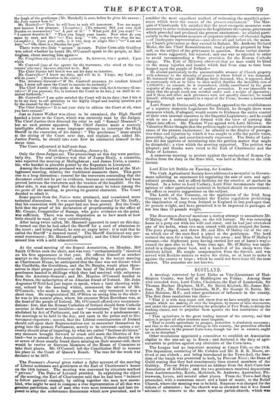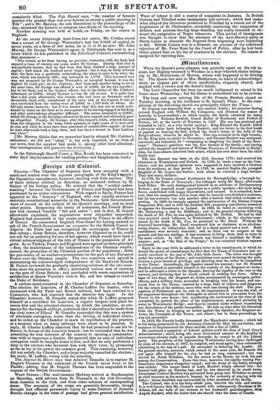SCOTLAND.
A meeting, convened by Lord Elcho as Vice-Lieutenant of Had- dington County, was held at Haddington on Friday. Among those who attended were, Lord Elcho, Chairman, the Earl of Lauderdale, Sir Thomas Buchan Hepburn, M.P., Sir David Kinloch, Mr. James Bal- four, M.P., Mr. Francis Charteris, M.P., Sir George G. Suttie, Mr. John Haldane, M.P., and other gentlemen of influence in the county. The first three resolutions ran thus-
" That it is with deep regret and alarm that we have recently seen the ab• tempts which are making all over the kingdom, by means of false statements, and under the pretence of advocating the principles of Free Trade, to delude the working classes, and to prejudice them against the best institutions of the country. " That agriculture is the great leading interest of the country, and that unless it prosper all other interests must languish. " That to enable agriculture to prosper, protection is absolutely necessary; and that in the existing state of things in this country, the protection afforded by an adherence to the present Corn-laws, though too low in amount, ought not to be disturbed."
Other resolutions appointed a committee to establish an Association similar to the one set up in Essex ; and declared it the duty of agri- culturists to petition against any alteration of the Corn-laws.
The League had an important meeting at Caper Fife, on the 18th. The deputation, consisting of Mr. Cobden and Mr. R. R. R. Moore, ar- rived at one o'clock ; and being introduced to the Town-hall, the free- dom of the burgh was presented to both, by Provost Nicol ; the Dean of Guild stating that they had unanimously been elected members of the Guildry. Provost Swan presented an address from the Anti-Corn-law Association of Kirkaldy ; and the two gentlemen received deputations from Auchtermuchty, Kettle, Markinch, St. Andrews, Anstrnther, Pit- tenweem, Leven, and several other places. From the Town-hall they proceeded, with a numerous escort and a band of music, to the Relief Church, where the meeting was to beheld. Sixpence was charged for the tickets of admission ; but the church was so crowded that it was found advisable to remove to the more spacious parish-church, which was completely filled. The Fife Herald says, "the number of farmers present was greater than was ever known to attend a public meeting in Fife"; and a Mr. Barclay, the sole dissentient to the proceedings of the . day, estimated the farmers to compose two-thirds of the meeting. Another meeting was held at Leith, on Friday, on the return to England.
At the recent Edinburgh Anti-Corn-law soirée, Mr. Cobden stated that a tenant of Sir George Warrender's had lost 9,0001. of capital, in seven years, on a farm of 400 acres, let at 71. or 81. an acre. Mr. John Murray, Sir George Warrender's agent in Edinburgh, has sent to us a letter which he has published in the Edinburgh Coerced, contradicting that statement-
" The tenant, so far from baying no previous connexion with the land, bad enjoyed a lease of twenty-one years under Sir George. During that time it was perfectly known that he had from this farm realized a large amount of capital ; bow much his landlord never inquired: but it may be fairly inferred that the farm was a profitable undertaking, for when it came to be relet, the rent, which was formerly 500/, was increased to 1,1701. This increased rent was not proposed by Sir George Warrender, or accepted because it was the highest he could get ; on the contrary, that farm and another being to let at the same time, Sir George was offered a rent of 2,8001. for the two together : but he let them, not to the highest offerer, but to the father of Mr. Cobdeu's informant, at 2,6001., simply because he was the old tenant. It is quite true that a few years afterwards, this tenant, who had been so fortunate and so favourably dealt with, complained of the rent, and, at his request, it was at once converted from the money-rent of 2,6001. to 1,100 bolls of wheat. He fell into arrest, however ; but tt was known that this was not so much occa- sioned by losses on the farm as in consequence of his having engaged in banking and other undertakings altogether different. The arrear amounted to 2,000/., which Sir George in the first place allowed to lie over unpaid, and ultimately gave np altogether. Finally, Sir George, after this tenants death, relieved his son from the obligation in the lease, while upwards of eight years of it were still to run, and chile he must have been possessed of considerable capital : at least he soon afterwards took a large farm, and has been a tenant in East Lothian ever since."
[Mr. Murray thinks that we somewhat hastily adopted Mr. Cobden's statement : we did not "adopt" it, but only reported, as an item of our news, that the speaker had made it, among other local allusions. Our correspondent will perceive the distinction.] In the Edinburgh Sheriff Court, a Miss Roalfe has been sentenced to sixty days' imprisonment, for vending profane and blasphemous books.



























 Previous page
Previous page